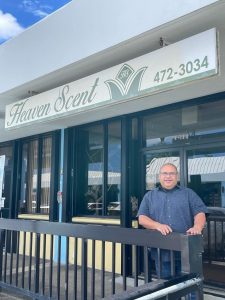By Oyaol Ngirairikl
The inflated cost of goods, freight, personnel, and other challenges are an issue that many regional small businesses face, according to the Guam Business Magazine Small Business survey. But not all these challenges are new..
Among those were Mayor Jesse L.G. Alig of Piti, who long before becoming an elected official started his flower shop, Heaven Scent. For his personal business, the cost of his flowers from various vendors around the world didn’t rise to levels like certain grocery products (think eggs, which increased in cost due to issues at U.S. mainland farms).
“The cost went up for flowers but not by too much. Honestly, for me it’s the freight cost that rose tremendously,” he says. For Heaven Scent, business came to a near standstill with the shutdown of COVID-19. Alig says funerals are a typical mainstay of flower shops – and his shop was no exception, but some business came unexpectedly.
“I was contemplating shutting down … that was around June or July 2020. Revenue-wise we were zero. We had inventory to move out, but we couldn’t sell, and we weren’t getting a cut on rent,” he says. “Ironically it was funerals … that’s how we survived. Even with the few funerals where families were able to put together a small ceremony … we had small orders here and there and that really helped.”
Alig had opted not to apply for any COVID-19-recovery related loans and is glad he made that decision.
“As COVID-19 started to ease off, business slowly got back to normal, and we weren’t quite there yet but we were OK. And I don’t’ have to worry about the added cost of a loan that I have to repay,” he said.
But to deal with the “exorbitant cost of freight” he says he had to adjust his prices. According to the magazine’s survey, most small businesses had to increase prices to accommodate the higher cost of doing business.
“You can’t do $100 for a nice arrangement anymore. Prices had to increase,” he says. A package that used to cost $475, in 2020 was increased to $690 and then last year increased to $895.
Alig says before the typhoon his business was on track to recover from COVID-19, thanks to efforts to reduce costs in other areas in addition to adjusting prices. However, he says he acknowledges that his industry is a little different from small businesses in the service industry, for example, that rely heavily on a wider variety of goods from a wider variety of vendors.
“The level of recovery of the local economy varies based on the industry, because there are still some business owners who are struggling to make it work … and some took out loans and even if it was a low-interest loan,” Alig says.
Alig says following COVID-19 more money was circulating in the economy. “I could feel that more people were spending more money.
“But then the storm came and that affected a lot of people. We hardly have any walk-in sales. But pre-storm people were coming by making small orders for birthdays and anniversaries.” Now he says, “I can count … the number of walk-ins in the last couple months after the storm.”
Mary P. Rhodes, president of the Guam Hotel & Restaurant Association; says labor issues have been “exacerbated by Guam’s shrinking population, employees leaving the service industry to other sectors (construction, allied health), and U.S. employers recruiting on Guam for jobs in the mainland.
“Unemployment trend went from 19% to 4% not including 50,000 who don’t want to work,” she says. “Available jobs are steadily increasing in the private sector per [the Guam Department of Labor], which means employers are hiring/rehiring,” Rhodes says. “And the labor pool has gotten much smaller because we have not been able to fill jobs.”
Like small business owners who responded to the Guam Business Magazine survey, she says inflation and the dramatic increases in the cost of goods and services “grew more than expected in the last couple of years.
“These persistent increases resulted in dramatic changes in buying power and capital for companies and even consumers, which in turn affects spending and revenue targets for businesses,” Rhodes says.
The tourism industry’s slower than expected recovery from the pandemic was slowed further by recovery from Typhoon Mawar.
“Although the island and its people are known to be resilient after typhoons, the issues resulting from this particular one had residual effects in issues that affect destination management such as debris management and removal, repair and restoration of Guam’s parks and bathrooms as well as facilities and buildings, infrastructure (power, water), reliable telecommunications, return of scheduled flights versus chartered flights, volume (availability of products when everyone is rebuilding capacity), etc.,” she says.
And Guam Power Authority’s load shedding outages“are critical issues when the businesses don’t have redundant systems to rely on due to the recent typhoon,” she says. “It’s necessary to consider other resources within the Department of Interior, Department of Commerce, [U.S. Department of Agriculture] for federal funding to help augment GPA with federal programs that help fund private sector initiatives that intimately benefit and assist the community during emergencies.”
Rhodes says 2023 has been extremely challenging having started the year with hopes of rebounding and getting to more than 30% of pre-COVID arrival numbers.
“Small businesses have been able to ride these challenges because of the impact and growth of federal and military funding to Guam. Regardless, we have to continue to rebuild our tourism industry in the next couple of years with short- and long-term goals to capture the outbound markets out of Asia. We need all three to perform well if we are to see Guam’s economy truly recover,” she says.
Rhodes says 2024 will likely be challenging as well “as we work to open up more flights to Guam to increase arrivals,” but if the community works together there’s always light at the end of the tunnel.
“Outside forces will always create pressure to the markets especially when the cost of labor, goods, shipping, transportation, commodities, utilities, and insurance are all increasing at the same time. Guam is generally very expensive because we have limited resources, therefore we need to start improving in areas that will have the greatest impact with technology, people, services, etc. This will make the difference and we have to alleviate the increasing costs of doing business on Guam,” she says.
David A. Alcorn, president of GFS Group, which includes King’s Restaurants, has seen similar challenges to managing expenses to weather economic storms that followed super typhoons and other emergencies to keep business going.

Lucy M. Alcorn, CEO; and David A. Alcorn, president; lead GFS Group, which includes King’s Restaurants.
He says when he and Lucy A. Alcorn – CEO of GFS and his wife – took over Kings in 1985 he never expected to see “the time that Kings would’ve been the corner stone of growth we’ve had with other restaurants along the way like Wendy’s, and Popeyes on base, etc. etc., and especially GFS and our federal and [Department of Defense] business.”
He jumped at the opportunity to own Kings when the majority and remaining owner Phil Schmidt decided to leave Guam and wanted to sell. But the Acorns also took on the business’s liabilities.
“I had no idea or understanding of a balance sheet or the financial obligations that remained or were tied to Kings at the time. It was a Business 101 lesson in finances,” he says. As with any venture, Alcorn says, “Risk versus return is always a consideration, but when you’re young you’re far more ambitious and fuller of energy. I’ve always had the mind set the glass is half full not half empty; I’m always eternally optimistic.”
He says when growing a small business, it’s important to have a plan and stay active in pursuing it.
“Consult with people or bounce your thoughts and plans off people that you consider knowledgeable in that area. Having a solid plan and foundation for growth helps mitigate any fears. Also we believe you get what you pay for when it comes to HR talent and capabilities,” he says. Some of the best decisions he made was to pursue federal or DOD solicitations and growth opportunities, he says.
“We’ve are very active in looking at new opportunities, especially with a Guam Pacific theater build up,” he says.
Monty McDowell, CEO and principal broker of Advance Management Inc.; says knowing your craft and being unafraid to push ahead helped AMI grow over the years – in the face of typhoons and other challenges. When he was initially hired by then principal owner, Baba Corp. as general manager, the company insisted he study the Japanese methodology of building maintenance. He returned to Guam, bringing with him the idea that building maintenance include “all of the customers’ maintenance and management needs – soup to nuts so-to-speak.”
“This means perform services such as HVAC, electrical, plumbing, carpentry, pumps, motors, custodial, grounds care and more, including managing properties,” he says.
While he has been willing to venture into new territories, he says there’s been some missteps along the way. His goal has been to learn from them. For example, he once ventured into construction “without having the competencies required to be successful.”
He says, “The island was full of construction companies and work, so I figured it must not take a lot to succeed. Boy, was I wrong. When I saw little to no money being made, I closed it down. I’m assuming I lost five figures of dollars, but really escaped before generating a huge financial loss,” he says.
He’s also had some big wins, looking at what could have been tough times as an opportunity. For example, he says when “the world economy went south.” He was a partial owner of AMI along with Baba Corporation and two Japanese based companies.
“At the time, Japan was suffering greatly, and our Japan based partners readily sold their shares to Baba Corporation and myself. At that point Baba Corporation, truly a tourist-oriented enterprise, wanted to venture into new areas of tourism,” he says. “In order to obtain financial capital to expand their business, they sold their shares in AMI to myself and a few of my closest business partners that I considered instrumental in our company’s success. We immediately took advantage of our ownership and federal small business stature.”
He says AMI formed a “Mentor-Protégé with a California-based company and collectively captured a $100 million federal multiple award service contract, encompassing much of the western United States.”
The contract never produced $100 million in contracts, but AMI did quite well, he says.
McDowell says for new small business owners, it’s critical to “have financial backing and personnel with core competencies that align with the work that you strive to perform.”
Like other small businesses that raised personnel concerns in the magazine’s survey, McDowell says having the right employees to do the professional work needed isn’t always easy.
AMI has about 200 personnel, he says. “We need workers at this time, but it is quite a challenge to source.”
















